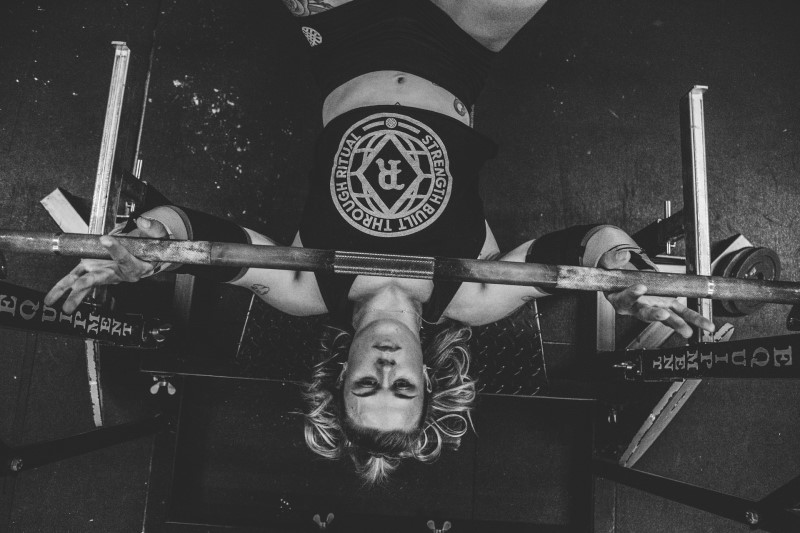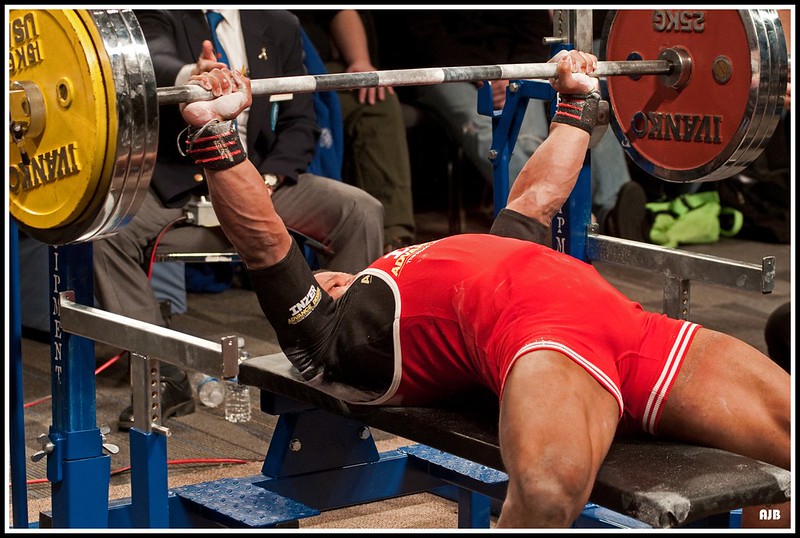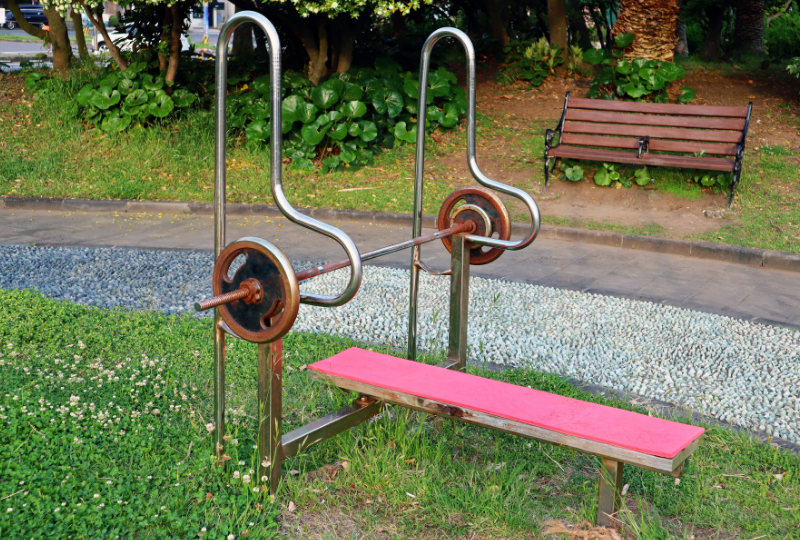This post may contain affiliate links at no additional cost to you. As an Amazon Associate I earn from qualifying purchases. Click to view our full disclosure.
What's inside
Along with the squat and deadlift, the bench press is one of the pillar exercises for any gym workout.
A fantastic full-body exercise, the bench press is great for building a foundation of strength and size.
But what is the average bench press by age for men and women?
Over my 12 years in the health and wellness industry, I have had many clients ask me this question, with concern to where they sit amongst their peers.
So, in this article, I am going to break down the numbers and tell you what you should be aiming for when benching at the gym.
Let’s jump in.
What is considered a good bench press?
Related: How Much Should I Be Able To Squat?
When it comes to finding the average of our lifts, we must first establish our categories. This way, you can clearly understand where it is you sit on the spectrum of lifting.
Averages will be broken down into categories, gender, age group, and skill level. This is done so you can accurately find what weight you should be pushing.
Over the course of this article, I will be giving you the numbers based on these factors to help you determine the correct weight for you. Then, I’ll share some helpful tips to push your bench press to the next level.
Note that the numbers provided are averages. Many of you will likely fall on either side of the recommended numbers.

Related: Smith Machine Bar Weights
Average Bench Press by Age (Male) (lbs)
| Age | Untrained | Novice | Intermediate | Advanced | Elite |
| BW Ratio | 0.50x | 0.75x | 1.25x | 1.50x | 2.00x |
| 20-29 | 100.5 | 149 | 212.5 | 286 | 365. |
| 30-39 | 101.5 | 150 | 214 | 289 | 368 |
| 40-49 | 95.5 | 142.5 | 202 | 272.5 | 349 |
| 50-59 | 83 | 123.5 | 175.5 | 236.5 | 304 |
The above table shows the average bench press by age for males. Categories are broken down into aged brackets and experience levels.
Males typically have a greater capacity for strength through their 20s, when their hormone (testosterone, growth) levels are at their peak.
After the age of 30, testosterone levels may decline by an average of one percent per year. That affects the promotion of muscle mass and energy.
However, improving nutrition and daily living habits can help stabilize testosterone decline, helping us maintain our strength levels.
Ages 20-29
From 20-29 years of age, you will often see the greatest lifts and results.
While lower than the 30-39 age group, the averages in the chart show a gradual increase in strength as many lifters begin their training through their 20s.
Ages 30-39
From ages 30-39, we can see that strength levels are consistent across the age range. Many who are lifting have formed a strong base through the earlier years of training.
This is combined with the continuation of an adult peak physical fitness phase, which gradually declines closer to 40 years of age.
Ages 40-49
From ages 40-49, we can see a slow decline in strength as lifters will experience a decrease in testosterone production.
While many lifters may have matured in their lifts over their years of training, aging is a natural part of the process and the ability to lift may decrease over time.
Ages 50-59
From ages 50-59, we see a further drop in average strength level. This can be due to the decrease in testosterone production as well as a general decrease in overall physical activity. Many gym-goers at this age will train far less than they would have in their early years at the gym.
The body weight ratio in the table above is calculated by:
Example:
Formula = bodyweight x bench press weight ratio = Bench Press Weight
Male = 180lbs (bw) x 1.25 (Ratio) = 225 lbs Bench Press Weight
* These figures are based on averages in body weight and experience level. Averages based on both lifts and bodyweight ratios will vary on a personal basis and should be taken only as a guide.
For a greater understanding of ratios and averages for your gym lifts, check out strength levels.

Average Bench Press by Age (Female) (lbs)
Related: 10 Best Chest Exercises For Women
| Age | Untrained | Novice | Intermediate | Advanced | Elite |
| BW Ratio | 0.25x | 0.50x | 0.75x | 1.00x | 1.50x |
| 20-29 | 37.5 | 67.5 | 109.5 | 159.5 | 218 |
| 30-39 | 37.5 | 68.5 | 110 | 161 | 220 |
| 40-49 | 37.5 | 65 | 104 | 153 | 208 |
| 50-59 | 31.5 | 56.5 | 91 | 132 | 181 |
The above table shows the average bench press by age for females. Categories are broken down into age brackets and experience levels.
Similar to the males, the female average bench press by age is consistent across ages 20 – 40 years of age. From here, there is a steady decline from ages 40-60 years.
Women overall tend to be weaker than men, as they have a smaller cross-section in individual muscle fibers, smaller bone structure, and lower testosterone levels.
Ages 20-29
From ages 20-29, the average strength numbers show that many female lifters are building their strength through this age range. While the numbers are lower than males, the pattern shows similar strength numbers.
Ages 30-39
Through age 30-39 we can see a stabilizing of strength levels, as female lifters of this age range may find they are maturing with their technique and performance.
Age 40-49
Like males, from ages 40-49, female lifters will see a steady decline in strength. This may be due to the reduction of physical activity levels and frequency of exercise as well as the natural effects of aging.
Age 50-59
From ages 50-59, we can see a further decrease in strength levels, which are much greater than the previous age ranges. This can be due to a slowing down of training.
The body weight ratio in the table above is calculated by:
Example:
Formula = bodyweight x bench press weight ratio = Bench Press Weight
Female = 110 lbs (bw) x 1.25 (Ratio) = 137. lbs (Bench Press Weight)
* These figures are based on averages in body weight and experience level. Averages based on both lifts and bodyweight ratios will vary on a personal basis and should be taken only as a guide.
How much should I be able to bench press?
Related: Powerbuilding Program (With PDF)
The amount you should be able to bench press is subject to the individual and their level of experience with the exercise.
A good rule of thumb is basing your bench press weight on a bodyweight x bench press weight ratio. Bench press weight ratios are based on strength and experience levels. Beginners should aim for 0.25 x bodyweight, intermediate = 0.75 x bodyweight, and advanced = 1.00 x bodyweight.
By multiplying your weight by these ratios, you will get the average weight you should be able to lift based on your body weight.

Related: Which Cardio Machines Burn the Most Calories Per Hour?
These, of course, are just rough guidelines to base your bench press weight on, meaning you may lift more or less than the recommended amount.
How much you should bench press can vary greatly depending on your level of experience both with the gym and exercise itself.
With large compound lifts in the gym, it can be easy to get carried away with wanting to push for personal bests while sacrificing technique.
Bench pressing is a phenomenal exercise for so many muscles, and with this in mind, we should base our weight not only on how much we can lift but how well we can lift it.
After all, we are aiming for the results we get from the bench press, and not just the number we are pushing.
So, a few easy ways to determine your bench press weight are presented below.
Bench Press Standards and Average
Bench press standards and averages allow you to compare your bench press weight with others lifting with the same body weight.
While there should not always be a comparison when it comes to your training, basing your lifts on your body weight and experience level is a great way to calculate the weight you should be aiming for.
Body Weight to Bench Press Weight Ratio
The bodyweight to bench press weight ratio provides you with a simple figure that you can multiply by your body weight. The result is a suggested bench press weight.
Example:
Formula = bodyweight x bench press weight ratio = Bench Press Weight
Male = 180lbs (bw) x 1.25 (ratio) = 225 lbs Bench Press Weight
While neither of these is foolproof, taking the time to calculate your ideal weight can go a long way to helping you determine where you should begin or a goal to set.

6 Tips to Increase Your Bench Press
Related: 12 Best HIIT Workouts For Women
Rarely does just performing the movement get the job done, and the bench press is no different.
Often, when our lifts plateau and we don’t see our numbers improving, we attempt to just keep pushing with little reward. This leads to frustration and even walking away from the exercise.
Here, I will give you some simple tips to break that frustrating plateau and increase your bench press.
Warm-Up
A good warm-up can consist of either light cardio of 3-5 minutes on any chosen piece of equipment. Or, lift warm-up sets of the exercise you’re about to perform, so, in this case, the bench press.
Warming up begins to stimulate the muscles and joints, increases blood flow, and gives the nervous system time to adapt to the upcoming stimulus.
Performing two sets, one with just the bar and then another with 50% weight of your first working set, will prepare your body for your upcoming working sets.
Technique
Technique is one of the most important factors when it comes to increasing your bench press. While the bench press is a great upper body exercise, it requires the entire body to perform to its full potential.
When bench pressing, it is important to stabilize the body in the correct position on the bench. Have shoulder blades back, chest out, elbows 45 degrees away from the body, and feet firmly planted on the floor.
While focusing technique can be boring at times, especially when we just want to push big weight, creating a solid foundation can really help to increase your bench press.
Train Strength (Low Reps, Heavier Weight)
Training for strength can increase your bench press. If you are lifting to repetition ranges for building muscle (8-12 reps), try lifting for strength by lifting 1-5 repetitions.
Changing your rep ranges will not only help to improve your lifts, but it will allow you to challenge yourself on a new task, helping to break through the frustration of your plateau.
Train Endurance (High Reps, Lower Weight)
Much like training for strength, changing your repetition ranges from 8–12 to a higher number such as 12-15 can add an element of fatigue to your workouts.
By challenging your body to train through different ranges we give it the ability to test different energy sources and create a different demand on our muscles.
Change Bench Press Movement/Style
Changing to different chest-based exercises continues stimulating the muscles required in a bench press while keeping your training fresh.
While many exercises aren’t drastically different from the bench press, they present a different challenge that can help to increase your bench press.
Train Accessory Muscles
The bench press is a compound movement, meaning you’re using more than one muscle at a time. This means that to increase our bench press, we should aim to train all the muscles that are associated with the lift itself.
This includes the chest, triceps, and shoulders, with some focus on stabilizers like lats and core.
By training these muscles outside of your major lifts, you will be able to focus on their individual function and performance, which will then carry over into your bench press.
How much does the bar weigh on a bench press?
Related: 12 Best Weight Training Exercises For Women
The bar on a bench press weighs 44lbs (20kgs). This is the standard for bench press bars, however, a 33lbs (15kg) bar is an alternative for women and novice lifters.
Final Recommendations
When determining how much you should be bench pressing, factors such as your experience level, age, height, weight, and gender should all be taken into consideration.
While all of the factors may be useful to deciding your ideal weight, you must do what is best for you. Bench pressing, like any exercise, is personal.
This means your lifts, performance, and strength should be based on your needs, and not in comparison to others.
So, are you having trouble with your bench press? Let me know in the comments below, I’d love to hear from you.

